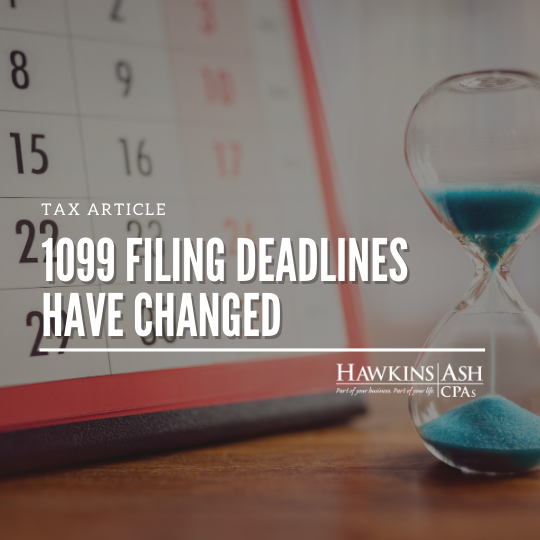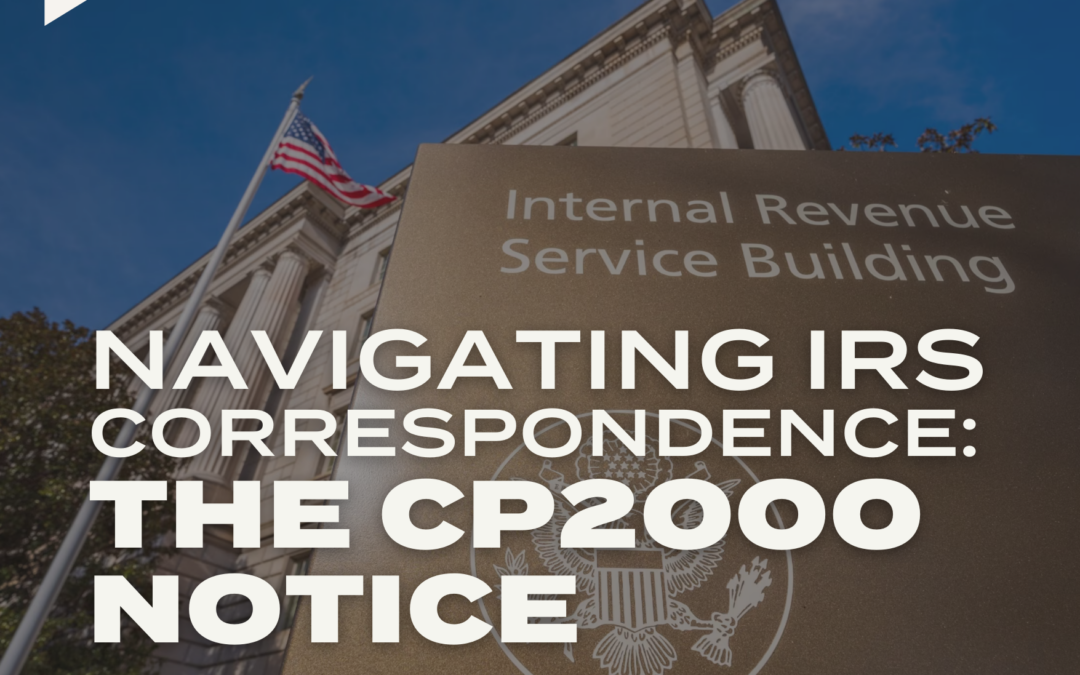The rules for filing 1099 informational forms have changed. Due to the PATH Act of 2015, the IRS has moved up the required filing deadline for many taxpayers to January 31, 2017. Failure to timely file these forms can result in extremely high penalties for taxpayers who are unaware of the filing requirements or those who simply fail to file.
Please review your 2016 activity to determine if you have a filing requirement for any cumulative payments made to a recipient. If you have not already done so, you should request and retain a Form W-9 for each payee with whom you have done business. By attaining a Form W-9, you have a clear understanding of the vendor’s entity type and will be able to determine your filing requirement.
Let Hawkins Ash CPAs Help
If you would like Hawkins Ash CPAs to help file your required 1099 forms, we ask that you forward completed W-9s to Hawkins Ash CPAs for each Form 1099 recipient. A W-9 is enclosed for your convenience. Please also fill out the attached electronic spreadsheet listing each vendor and return it to us by January 15, 2017.
Please be sure to contact us if you have any questions or concerns.
New Filing Deadlines
Beginning with the 2016 forms, filers required to report Nonemployee Compensation (Box 7) are now required to timely file Form 1099-MISCs by January 31, 2017. For Form 1099-MISCs not reporting Box 7 Nonemployee Compensation and for other 1099 forms, the due date will remain February 28, 2017, for paper filings and March 31, 2017, for electronic filings. Penalties apply for failure to timely file with the IRS.
Examples of Non-employee Compensation Payments
- Professional services fees paid to attorneys, accountants, engineers and architects
- Services received in the course of trade or business
- Independent contractors
- Guest lecturers
- Commissions paid to a non-employee salesperson
- Services for entertainment
- Director fees
Generally, 1099 forms are required to be furnished to the recipient by January 31, 2017. For Form 1099-MISCs reporting Box 8 or Box 14, those must be furnished to the recipient by February 15, 2017. Timely furnished forms must be hand-delivered, electronically delivered or postmarked by the applicable due date. Penalties apply for failure to supply these forms in a timely manner.
General Rules
There are several informational returns that must be filed annually as required by the IRS. Here is a list of forms that must be filed along with some general filing requirement rules:
Form 1099-INT
Payments by a business or an individual for interest of $10 or more must be reported on Form 1099-INT.
Form 1099-DIV
Payments made by a business are required to be reported on Form 1099-DIV for the following:
- Payments of $10 or more for dividends
- Payments of $10 or more for capital gain distributions
- Payments of $600 or more for payments paid for liquidating distributions
Form 1099-MISC
Payments of $600 or more made to individuals, partnerships, LLCs, attorneys, and unincorporated businesses are required to be reported on Form 1099-MISC for the following:
- Payments for rents (including rental of equipment or real estate)
- Payments for services, including parts and materials, if paid in conjunction with the service.
- Payments for non-employee compensation including fees, commissions, prizes, awards and services performed for your business.
- Payments to an attorney (even if the attorney operates as a Corporation, see below)
Generally payments made to Corporations are not reportable; however, there are also a few payments made to Corporations that must be reported. Payments made for Medical and Healthcare, fish purchases for cash, payments of attorneys’ fee and gross proceeds paid to attorneys must all be reported.
Penalties for Failure to File by Due Date or Incorrect Information Filed
Failure to timely file (without showing reasonable cause) will result in the following penalties:
- $50 per informational return if filed within 30 days following the due date; maximum penalty of $532,000 per year ($186,000 for small businesses*)
- $100 per informational return if filed after the 30 days after the due date and before August 1; maximum penalty of $1,596,500 per year ($532,000 for small businesses*)
- $260 per informational return if filed after August 1 or if not filed; maximum penalty of $3,193,000 per year ($1,064,000 for small businesses*)
*Generally, a business is considered a small business if its average annual gross receipts for the three most recent tax years is $5 million or less.
If the figures reported on the 1099 forms are incorrect, penalties may also apply.





